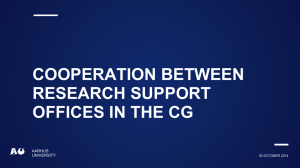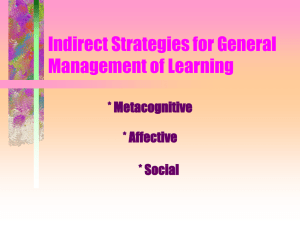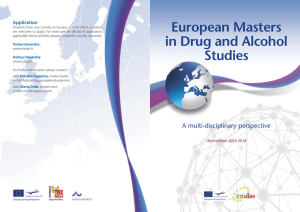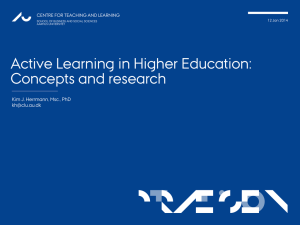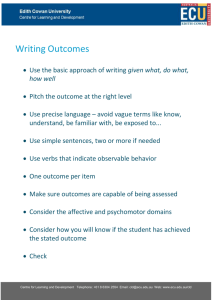Cultural Im/materialities
advertisement
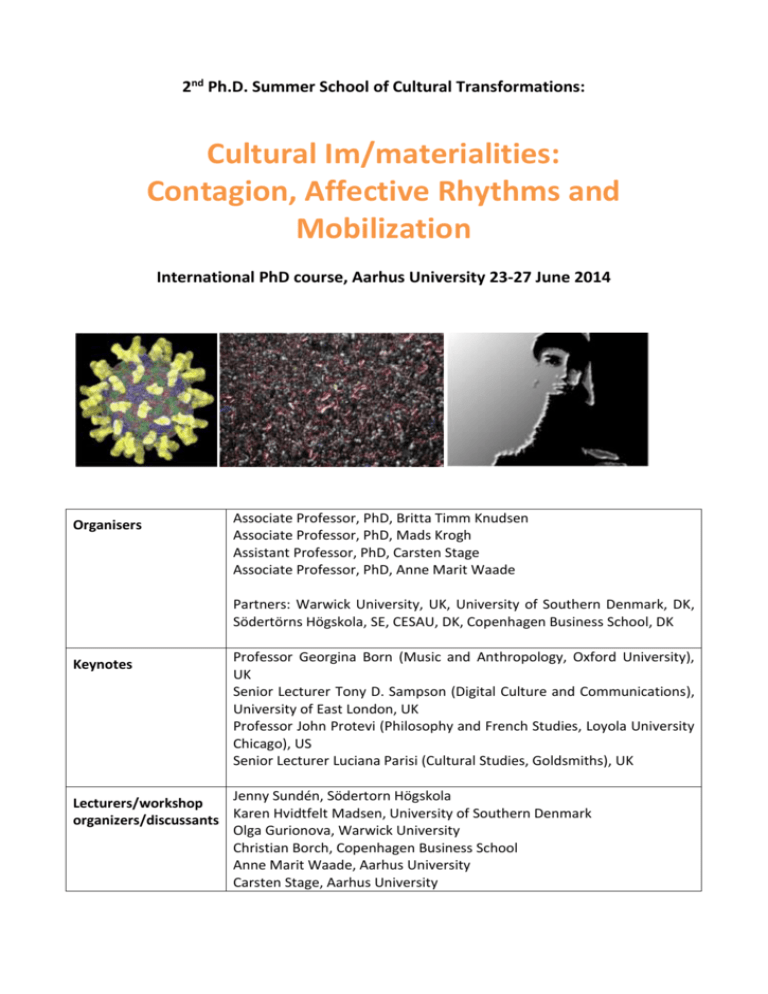
2nd Ph.D. Summer School of Cultural Transformations: Cultural Im/materialities: Contagion, Affective Rhythms and Mobilization International PhD course, Aarhus University 23-27 June 2014 Organisers Associate Professor, PhD, Britta Timm Knudsen Associate Professor, PhD, Mads Krogh Assistant Professor, PhD, Carsten Stage Associate Professor, PhD, Anne Marit Waade Partners: Warwick University, UK, University of Southern Denmark, DK, Södertörns Högskola, SE, CESAU, DK, Copenhagen Business School, DK Keynotes Professor Georgina Born (Music and Anthropology, Oxford University), UK Senior Lecturer Tony D. Sampson (Digital Culture and Communications), University of East London, UK Professor John Protevi (Philosophy and French Studies, Loyola University Chicago), US Senior Lecturer Luciana Parisi (Cultural Studies, Goldsmiths), UK Jenny Sundén, Södertorn Högskola Lecturers/workshop organizers/discussants Karen Hvidtfelt Madsen, University of Southern Denmark Olga Gurionova, Warwick University Christian Borch, Copenhagen Business School Anne Marit Waade, Aarhus University Carsten Stage, Aarhus University Mads Krogh, Aarhus University Britta Timm Knudsen, Aarhus University Christoffer Kølvraa, Aarhus University Louise Fabian, Aarhus University Camilla Møhring Reestorff, Aarhus University Bodil Marie Thomsen, Aarhus University 5 ECTS Time June 23-27 2014 Room and Place Aarhus University Cost/ Policy No cost fee, each participant covers travel & accommodation. Max. number of participants 30 Description The summer school wants to explore the role of affect, suggestive rhythms and contagion for the somatic mobilization of agents across a range of socio-cultural situations (e.g. protest events, dance halls, online forums, catastrophes), practises and processes (e.g. political mobilization and engagement, school bullying, youth loneliness, xenophobic/nationalist panics). In recent years an increasing interest in materiality, space, technology and embodiment has developed in the humanities and social sciences combined with an ‘affective turn’ (Clough, Massumi, Thrift, Seigworth and Gregg, Ahmed) to immaterial dimensions of these phenomena. This has re-actualised early sociological theories about affective suggestion, contagion and imitation (e.g. Gustave Le Bon and Gabriel Tarde), which offer valuable insights to the analysis of a contemporary cultural landscape characterised by for instance viral/memetic phenomena, mediated/networked/rhythmically coordinated crowds, affective online communication and political modulation of citizen affects (Blackman, Borch, Gibbs, Sampson, Butler). During the summer school we wish to collectively explore the immaterial dimensions of the material social world and vice versa, discuss the potentialities, implications and risks of such analysis in an open interdisciplinary environment. The event will attract PhD students from a range of academic fields (anthropology, geography, media, cultural studies, aesthetics, sociology, political science etc.) interested in, and doing research on, the affective turn, processes of imitation/suggestion/contagion, the rhythmically attuning mobilisation of bodies, and the im/material dimensions of culture and the social world. Possible areas/topics: - The affective dimensions of materiality, space, technology and things - Aesthetics and affectivity, sensual design - Mobilization within public and private spheres of action - Viral communication, virality in the media, memes, social media - The methodological challenges of analysing cultural materialities and immaterial processes - Theoretical legacies to the ‘affective turn’ and new materialist orientations within the humanities and social sciences; early sociologies of contagion, suggestion and imitation - Moral, media and financial panics Music culture, sound, dance and rhythm Industries of affect, affective consumption Tourism, black spot/dark tourism Artistic agency, idols and fandom Crowds, protest culture, social movements, (creative/eventful) activism, political events Depression, loneliness, bullying, affective exclusion Charity, empathy and sympathy Affect, emotion and power, war and affective modulation Xenophobia, nationalism, the strategic production of fear and hate Atmosphere, aura, prestige Sexuality, porn, love and care The affectivity of catastrophes Blasphemy, fanaticism and provocative politics The Ph.D.-summer school will be based on keynote presentations, workshops and students own project presentations and organized feedback sessions. Exam: The examination will consist of three parts: 1. Full paper hand-in (deadline May 15); 2. Attending workshops and doing group assignments; 3. Paper presentation and discussion of papers. Deadline for submission Deadline: March 1 2014, Send an email to: Marianne Hoffmeister mho@adm.au.dk Attach a description of your research topic and project (max. 300 words). March 15: You will get to know if you participate, and you will be asked to confirm your participation. Preparation for PhD students April 1: The organizers will form groups out of the participants (5 in al) and each group has to organize a slot of one hour each with a social and/or academic content (e.g. academic speed-dating, guided tours in Aarhus for strangers by strangers, exercises between the slots). May 15: Deadline for submitting a full paper (10 pages) Preparation for teachers Medio March: Organizers must read the abstracts and form participants groups. Medio May: The group of teachers will be responsible for 3-4 papers, that he/she has read carefully in advance in order to 1) place the paper within the theme of the summer school 2) to be a discussant of the paper and to give an open and constructive feedback at the summer school Program Monday 23 June 2014 Time 8.30 Activity Registration 9.15 Welcome and practical information 9.45 Building 5335 Room 091 11.00 Lecture I: Jenny Sundén (Södertörn University, Sweden): “Out of Breath: Affect, Relationality, Power” Hit and run coffee break 10.30 Workshop I: “Rhythm” Building 5335 Room 091 13.15 Lunch 14.15 Parallel paper-session I 16.15 Coffee break 16.45 Lecture II: Tom Apperley (University of New South Wales, Australia): “Gaming Rhythms” Academic programme ends Group dinner and evening event Including activity organized by local PhD students 18.00 19.00-? Venue Building 5335 Room 091 Building 5335 Room 091 Tuesday 24 June 2014 Time 09.00 Activity Lecture III: Luciana Parisi (Goldsmiths, UK): tba 10.15 Hit and run coffee break 10.30 Parallel paper session II 12.30 Lunch 13.30 Workshop II: “Affect” 15.30 Coffee break 16.00 Activity organized by student group A 16.30 Lecture IV: Nathaniel Tkacz (Warwick University, UK): “AdVenture Capitalism: On Crowdfunding and The Financialisation of The Web ” Academic programme ends for the day 18.00 Venue Building 5335 Room 091 Building 5335 Room 091 Building 5335 Room 091 Building 5335 Room 091 Wednesday 25 June 2014 Time 09.00 Venue 10.15 Activity Lecture V: Tony D. Sampson (University of East London, UK): “Affect, Contagion and the Brain” Hit and run coffee break 10.30 Parallel paper session III Building 5335 Room 091 12.30 Lunch 13.30 Workshop III: “Contagion” Building 5335 Room 091 Building 5335 Room 091 15.30 Coffee break 16.00 Activity organized by student group B 16.30 Lecture VI: Christian Borch (CBS, Denmark): “The Politics of Crowds: Organizing Bodies and Affect” Academic programme ends 17.45 18.00-? Building 5335 Room 091 Group dinner followed by a walk through the city and a visit at a museum Thursday 26 June 2014 Time 9.00 Activity: Partner keynotes Lecture VII: Georgina Born (Oxford University, UK): tba 10.15 Hit and run coffee break 10.30 Parallel paper session IV 12.30 Lunch 13.00 Workshop IV: “Assemblages” 14.30 Afternoon 18.00-? Activity organized by student group C Organized sightseeing Venue Building 5335 Room 091 Building 5335 Room 091 Group dinner Friday 27 June 2014 Time 09.00 Activity Lecture VIII: John Protevi (Louisiana State University, US): “Rhythm, Affect and the Greeks” 10.15 Hit and run coffee break 10.30 Workshop V: “Biopolitics and mobilization” 12.30 Lunch 13.30 Parallel paper session V 15.30 Coffee break 16.00 Paper session VI 18.00 Activity organized by student group D 18.30 Goodbye Venue Building 5335 Room 091 Building 5335 Room 091 Building 5335 Room 091 Building 5335 Room 091
